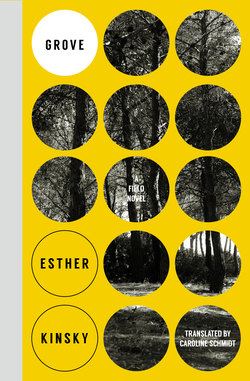Читать книгу Grove - Esther Kinsky - Страница 15
На сайте Литреса книга снята с продажи.
ОглавлениеHeart
ON CLEAR DAYS in the first weeks of January, the village lay as if quarried from red stone in the light of the sun, which rose between the mountains behind the cemetery. From my veranda I watched it awake into a toy world, moved by invisible hands: windows opened, a garbage truck crept backward through the lanes, and small figures in blazing vests carried over the trash cans, emptying them into the barrel. Past the palm tree I looked down directly onto the greengrocer that opened its doors around this time. The Arab men arranged the displays, bright oranges slipping into my view of the gray lane. On a large cart lay a mountain of artichokes. In the courtyard behind the closed gate next to the greengrocer, broken plywood crates towered beside mountains of spoiled oranges, tomatoes, heads of green cabbage or lettuce, visible only from here above, a concealed pendant to the neat arrangements in front of the shop. The men, the stands with fruit and vegetables, the garbage truck—it all seemed to be part of a distant theater. Or an unusual theater, whose performances are viewed only from a distance. There was no audience up close.
Behind the village, hills ascended blue and gray, the highest ridge crowned with a row of parasol pines which from here below looked like an ossified platoon, scattered colossal soldiers of an army, perhaps, a rearguard bereft of all hope and any prospect of returning home, cut off from intelligence and provisions, standing exposed at this height to all harsh and bitter weather, lost in contemplation of the valleys. From up there they would have seen boulders, barren grasslands, Olevano in the distance, maybe the village on the right, the dark cemetery lodge on the left, between them the house on the hill—a different order.
As the sun rose higher, the red wore off and the village turned gray. I set out for the gray village, for the greengrocer where Arab men in black anoraks and gloves made calls over Arabic music playing on the radio, or spoke to one another in quarreling tones. They let the weight of their fingertips rest lightly on the scales when weighing the produce and always added a gift to the purchased goods.
I bought oranges and artichokes. The bag was light, but walking home my heart was always so heavy, I thought I wouldn’t be able to carry it back to the house. Again and again I stood still and stared, abashed by my weakness, up to the sky and the trees. In several conifers I discovered whitish clews in the forks of high-lying branches and twigs: bright gossamer, veiled spools, tapered downward slightly, chrysalides of remnant clouds, inside of which were perhaps rare butterflies maturing; they would hatch in summer and, spreading their wings in who knows what colors, alight, imperceptibly trembling, on the fornetti next to the perpetual lamps, their glow now dissolved by the glaring sun.
The heavy heart became my condition in Olevano. When I climbed up to the house, coming from the village. When I walked uphill, from the house to the cemetery.
I pictured a gray heart, light-gray with a cheap sheen, like lead.
The leaden heart grew entwined with all I had seen that took root in me. With the sight of the olive groves in fog, the sheep on the hillside, the holm oak hill, the horses that from time to time grazed silently behind the cemetery, with the view past the plain and its small, shimmering fields on cold mornings frosted bluish. With the daily smoke columns from burning olive branches, with the shadows of the clouds, with the winter-pallid thickets and violet blackberry vines along the waysides.
